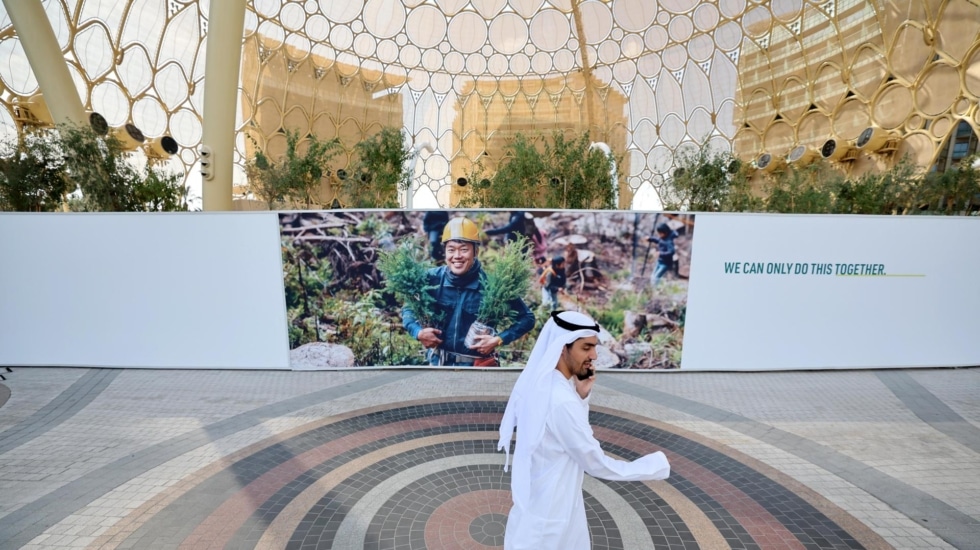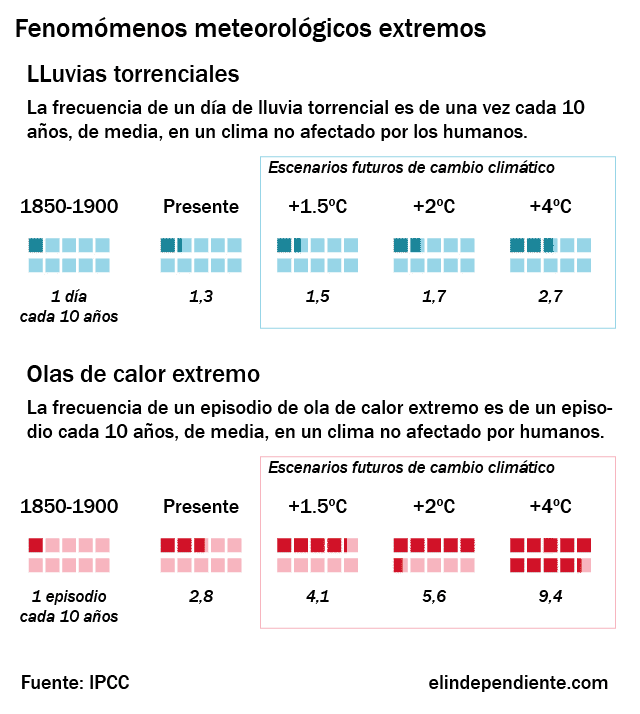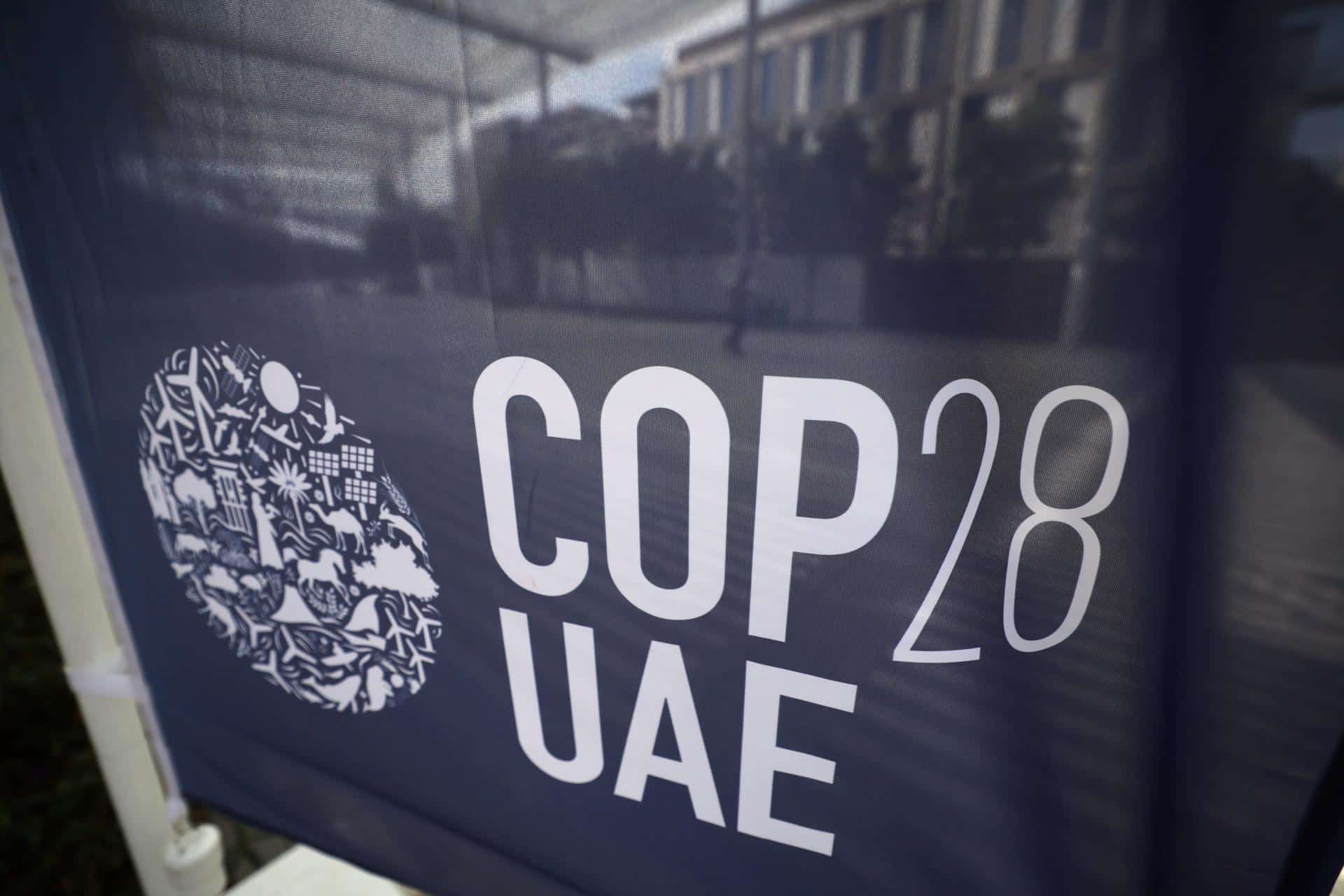

A man walks through the door of Expo City Dubai, where COP28 is taking place.
COP, the United Nations Framework Convention on Climate Change, takes place this year from November 30 to December 12 in Dubai, United Arab Emirates. Once again, countries are reporting their progress and commitments to tackle climate change, with a particular focus on phasing out fossil fuels, which cause the greenhouse effect that everyone agrees is increasing the planet’s temperature year after year. even oil companies.
The effects of global warming have become a pattern of escalation that will continue throughout the 21st century. 2023 will be the warmest year on record, surpassing 2016, until another year – sooner rather than later – tops it. The effects of rising temperatures are being felt around the world in the form of heat waves, droughts, floods, crop failures, inflation and widespread wildfires. On the crest of the great tsunami called global warming, the countries decided to meet in Dubai, the geopolitical epicenter of a society organized around fossil fuels, to discuss whether they were serious about the energy transition of the world economy. to avoid temperature rise.
The air temperature is rising
Slowing fossil fuel use is expected to Paris Agreement 2015to ensure that global temperatures remain 1.5°C, to a maximum of 2°C, above pre-industrial levels. But this goal is becoming more and more difficult, and scientists, in light of the current rise in global temperatures, see these goals disappearing.
According to the European Center Copernicus Climate Change Service (C3S)July this year was already 1.5ºC warmer across the planet than the pre-industrial average, although this is thought to be temporary as the annual average is a significant global warming milestone. “The era of global warming is over, the era of global boiling has begun,” UN Secretary-General António Guterres emphatically declared that same month.
At the summit, the parties, that is, the governments, send delegations that evaluate progress, report on the progress of their countries and agree on new commitments for subsequent summits. They mainly discuss several main thematic areas: adaptation, loss and damage. Then there is the ever-present issue of funding, which will be critical at this summit as it is expected to challenge the transfer of funds from rich to poor countries for mitigation and adaptation actions, currently set at $100 billion per year.
Device
The impact of climate change on our society is a fact, and every country must adapt to how it will be affected by rising temperatures. This is adaptation to climate change, and it is important that the impacts are small. This covers all types of activities depending on the country. For example, the increase in temperature in May, June and September requires acclimatization of schools so that they can follow the normal course, a need that previously did not exist because the weather did not require cooling. Reducing the vulnerability of people and areas is another way to adapt to change, such as forest policies that prevent fires from growing, or greening cities to make them more livable.
At KS: Negotiations at this summit are expected to launch the framework of the Global Adaptation Goal, creating guidelines for countries that will define priorities and courses of action, among other issues, to implement adaptation.
mitigation
Climate change is like driving a car: even if we stop doing everything that causes warming, the gas emissions are still present in the atmosphere, we cannot stop it, only mitigate it, only make it affect us less. To achieve this, it is necessary to carry out social and economic transformations aimed at reducing emissions as much as possible.
While adaptation protects us from the immediate impacts of climate change, mitigation works to ensure that future impacts are less harmful and have less impact on our health and society. That, for example, in Spain in a few years in the summer there could be two or three heat waves, like now – and there are already many of them – and not allow it to turn into a season that will make our country uninhabitable and therefore uninhabitable for example. no one wants to come to our country on vacation.

A mitigation measure could be environmentalists’ proposal to ban short flights between cities that can be reached by train. This measure was adopted in France and is likely to be adopted in Spain. These are discussions about how all countries should address climate change, how much they reduce and how quickly. According to the Official College of Aeronautical Engineers of Spain (COIAE), the measure, applied across Europe, would reduce emissions by just 0.1%, while road traffic accounts for 71.7% of emissions. The discussion at the summit and in each country is about how ambitious we should be in terms of climate change mitigation, how much we are going to protect ourselves from the future impacts of climate change. This is what politicians and technologists talk about at summits when they talk about being more ambitious.
At CS: The EU and members of the High Ambition Coalition are pushing for a fossil fuel divestment agreement at this summit. But some countries, such as China and India, are against it.
Loss and Damage
Emissions caused by global warming have been linked to human economic activity since the Industrial Revolution. This means that the countries that have had the most economic development have historically been the most polluting. It so happens that the least developed countries are suffering the most from climate change and are being asked to give up their dependence on oil and gas when they have many economic needs. “Loss and damage” refers to the compensation that should be received by developing countries that are suffering the most from the consequences of this crisis for which they are not responsible.
At KS: In the preparatory meetings for COP 28, developing countries agreed with developed countries that the World Bank would host a Loss and Damage Fund and that the minimum amount should exceed $150 billion per year. Civil society groups attending the summit are calling for a tax on fossil fuels to offset losses and damages. A recent Climate Action Network (CAN) report estimates that a tax on fossil fuel extraction could raise $210 billion. They require more ambition.
KS28 calendar

- November 30 Founding meeting.
- December 1 World Climate Action Summit.
- December 2 World Climate Action Summit.
- December 3 Health/Help (=Loss and Damage, Adaptation).
- December 4 Finance/Trade/Gender/Equality/Accountability.
- December 5 Energy, Industry / Just Transition / Indigenous Peoples.
- December 6 Multi-level event / Urbanization and construction / Transport.
- December 7th Day of rest.
- December 8 Youth, education and skills.
- December 9 Nature, land use and oceans.
- December 10 Food/Agriculture/Water.
- December 11 Negotiations.
- December 12 Negotiations
Source: El Independiente